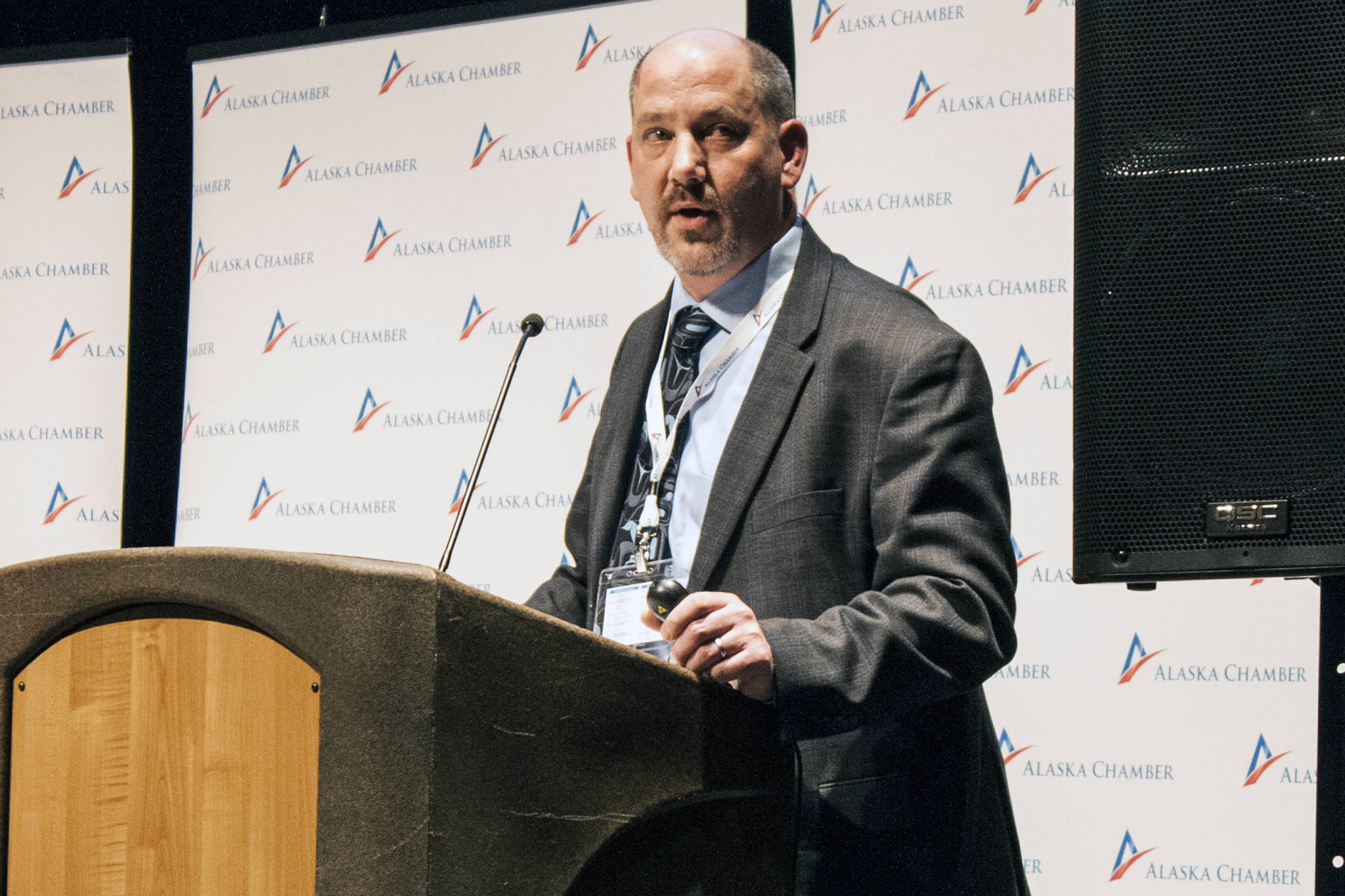Alaska Department of Conservation Commissioner Jason Brune told Alaska Chamber members he wants to know what his department can do to help business.
Brune, who spoke during the chamber’s annual Legislative Fly-In Wednesday at Centennial Hall, said he wants to help signal Alaska is open for business and learn what regulations might be stymieing growth.
“Our goal is not to reduce environmental protections or eliminate anything that protects human health and the environment,” Brune said. “It’s to get rid of that additional cost and that regulatory red tape.”
Aside from speaking to a willingness to work with business leaders, Brune also provided a general update regarding DEC and highlighted projects in the department’s future as well as few things he didn’t know about the DEC prior to becoming commissioner in December 2018.
Here are three takeaways from his speech.
A successor to the Ocean Ranger program is in the works
Brune described a program proposal he characterized as an improvement on and alternative to the Ocean Ranger program.
That program was created in 2006 via a voter-approved ballot initiative and sought to not only to catch cruise ship violations but to maintain a presence on board ships to discourage environmental misbehavior. It was funded by a $4 per berth Ocean Ranger fee, but appropriations for the program were vetoed out of the budget for this fiscal year.
[Lawmakers question repeal of anti-cruise pollution program]
“We will be proposing early season inspections of every boat that comes into Alaska,” Brune said. “We will be trying to incorporate technology into the monitoring. We want to regulate the cruise ship industry like we regulate every other industry. There aren’t oil and gas rangers, or mining rangers or fish rangers. There shouldn’t be Ocean Rangers.”
He said regular inspections and surprise inspections will be part of the plan.
Brune said local communities tend to discharge more waste than cruise ships.
“What we’re proposing is using the money that was formerly spent on Ocean Rangers to upgrade the community wastewater treatment plants on shore that are obviously having a significant impact on the environment,” Brune said.
He said the proposed program would be like the Village Safe Water program and feature low-interest loans, grants and loan forgiveness communities visited by cruise ships to upgrade wastewater treatment plants.
Technology is part of the plan
Brune said technology could be a way to maximize effectiveness within DEC’s budget limitations.
“As our budgets have decreased significantly over the last five years, we need to do more with less,” Brune said. “The way you do more with less is you incorporate technology.”
That could mean using FaceTime to conduct inspections, he said, and he mentioned technology as being part of the strategy for monitoring cruise ships.
“Instead of having someone fly out to Dutch (Harbor) and do a one-hour inspection, why not try to incorporate technology and use the iPhone?” Brune asked. “We’re looking at that. The EPA never thought about that.”
Brune also included the DEC’s little-known Yuck-line in his presentation.
“This is something we just put in place,” he said. “I put this on here because I didn’t know it when I took this job. We oversee restaurant inspections at DEC. That’s part of our environmental health.”
The line, 764-9825(YUCK), is for reporting food issues and instances of food poisoning, Brune said.
The line is staffed from 8 a.m.-4 p.m. Monday through Friday and can be called or receive text messages. Yuck-line staff then interview the caller or texter for 20 to 30 minutes to find out more about symptoms and the possible origin of foodborne illness, according to the Yuck-line website. After the interview, the suspected source of illness is investigated.
“It’s a cool little service,” Brune said.
PFAS is in the plans
Brune called per- and polyfluoroalkyl substances, collectively known as PFAS, his favorite issue during his speech.
“I had not heard of PFAS before taking this job either,” Brune said before sipping some water. “I just drank some PFAS.”
The so-called forever chemicals are linked to low birth weights, cancer, thyroid hormone disruption and other illnesses, according to the Environmental Protection Agency. They’re present in groundwater and soil throughout the U.S., including Alaska. In Alaska, the contamination is generally linked to PFAS-containing firefighting foam commonly used at airports, Brune said.
[Chemical contamination will cost the state millions]
He said when he first became DEC commissioner there was a plan in place to ship contaminated soil from Fairbanks to Oregon.
“I learned after the fact I am the only DEC commissioner in the United States that has permitted for looking at incinerating PFAS-contaminated soil,” Brune said. “We studied that and nearly 99.99 percent of the PFAS chemicals were eliminated.”
Brune said last year there was “a little hiccup” in deciding what chemicals to include in PFAS testing.
“The previous administration was testing for six PFAS chemicals,” Brune said. “For a couple of months, we decided we were only going to test for the two PFAS chemicals that have lifetime health advisories, PFOS and PFOA, that the EPA sets.”
He said it has since been decided that PFAS testing will include 18 chemicals.
“On top of that, we’re also putting all of that data up on our website,” Brune said.
A member of the audience noted that PFAS testing measures the chemicals in parts per trillion, which seems stringent since arsenic in drinking water is measured in parts per billion.
Brune said the threshold set by the EPA is the equivalent of one drop in an Olympic-sized swimming pool, an analogy that’s been widely used in reporting on PFAS.
“You’re right,” Brune said. “To set those potential requirements on such a low threshold is very concerning, but we have to be focused on the impacts science is showing it can have on human health.”
• Contact reporter Ben Hohenstatt at (907)523-2243 or bhohenstatt@juneauempire.com. Follow him on Twitter at @BenHohenstatt.

